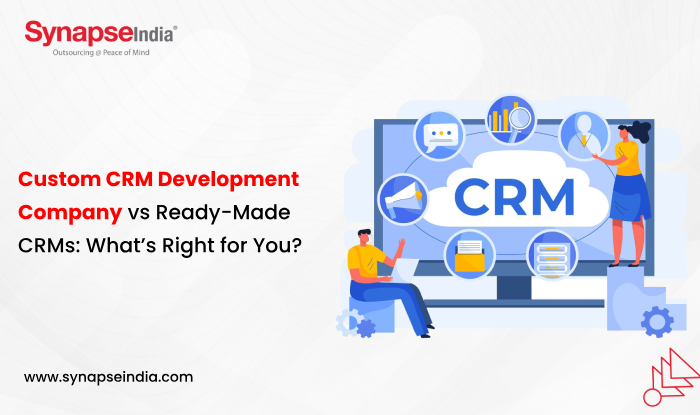 27 Nov 2025
27 Nov 2025
Many teams today want a CRM that matches how they actually work. The global CRM market touches $89.9 billion in 2025 (PR Newswire), showing how important these systems have become for sales, support, and customer handling. But not every setup suits every business.
A Custom CRM Development Company builds something that fits your processes through focused CRM web development. Ready-made CRMs help you start quickly.
Here is a clear look at both so you can pick what fits your business.

A ready-made CRM is a tool you can sign up for instantly. Platforms like Salesforce or HubSpot come with contact storage, email workflows, and basic tracking. Small teams or startups often choose these because they need something fast without heavy planning. You can upload your contacts, set simple rules, and start working within days. This works well when processes are simple and budgets are tight.
But these tools follow a standard flow. If your sales steps or customer cycles work differently, you may need to change your operations to suit the software. Here are the main advantages before moving to the next section:
A Custom CRM Development Company creates a CRM that fits your exact workflow. Everything from screens to fields is designed around your daily tasks. This avoids the force-fit that often happens with preset tools.
This is especially useful for growing businesses or fields like manufacturing, healthcare, logistics, or retail. When processes are unique, a custom system adapts smoothly. You can add your business rules, approval paths, mobile access, and any data links you want. Below are the main benefits you get with custom development:
The upfront cost is higher, usually between $50,000 and $200,000. But long-term savings are strong because you avoid paying for unused features.
Research shows the CRM market is rising quickly with a 14.6% CAGR through 2030 (Grand View Research), and many larger firms now prefer custom builds for this reason.
Ready-made CRMs look affordable in the beginning. But subscription costs rise as teams and feature needs increase. A team of 10 may spend $200 to $500 monthly. Add reports, analytics, or extra connections, and the price climbs further. Extra fees often show up later:
Every $1 spent on CRM produces $8.71 in return (Nucleus Research), but only when the system supports real work. A mismatched tool slows down sales and operations.
Custom setups cost more upfront but only need yearly maintenance. This often balances out within 2–3 years for mid-sized teams.
Not every company needs custom work. A solo operator or early-stage startup can work well with ready-made tools to test processes. Custom CRM development becomes the better choice when your processes are complex or your growth plan requires flexibility. This includes:
Custom setups also help teams reduce manual work, avoid tool switching, and maintain full control over their data path.
Ready-made CRMs start quickly, but the real work comes during data setup, permissions, and training. Many teams need weeks before using the system smoothly.
Custom development takes longer, usually 3 to 6 months, because the process includes requirement study, design, development, testing, and adjustments. The result is a CRM that fits from day one, without workarounds.
Businesses in 2025 are expected to reach nearly full CRM adoption, and the most successful ones invest time in planning the right type for their team.
At SynapseIndia, our team has guided many USA-based companies through CRM software development that works with their operations. Our approach focuses on building systems that reduce clutter, speed up routine tasks, and support long-term growth.
We create CRM setups that match how your team works and support them with ongoing refinement. Many clients report shorter sales cycles and smoother daily use.

Ready-made CRMs support quick starts, while custom CRM development offers long-term fit. Smaller teams prefer instant setup. Growing teams benefit from systems that adapt to their workflow. Picking the right one avoids future frustration, cost, and process gaps.
Most ready-made CRMs charge $10–$150 per user each month. Costs rise with automation, analytics, or extra tools. Mid-sized teams often spend $5,000–$50,000 yearly.
HubSpot, Zoho, Pipedrive, and Freshsales work well for startups due to simple setup and basic tracking features.
Custom development usually takes 3–9 months depending on complexity and integrations.
Most allow standard integrations through APIs. Special tools may need paid plugins or manual setup.
Yes, when you manage stock, multiple stores, or complex order flows. Custom builds create cleaner connections between orders, customers, and inventory.

